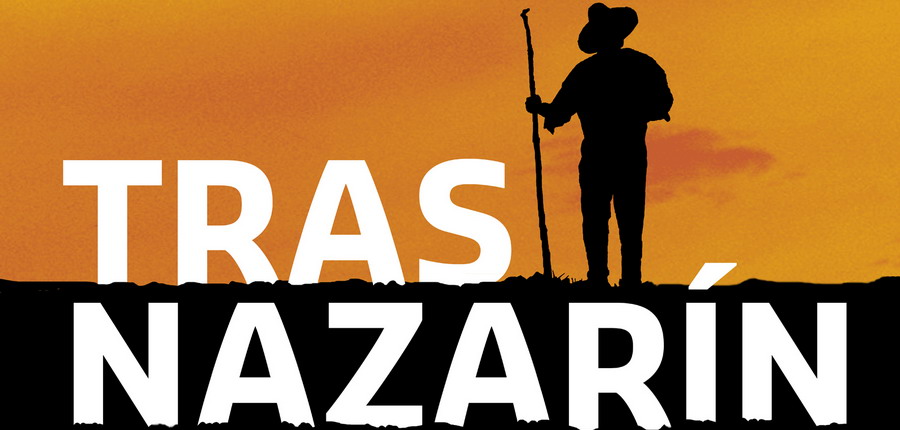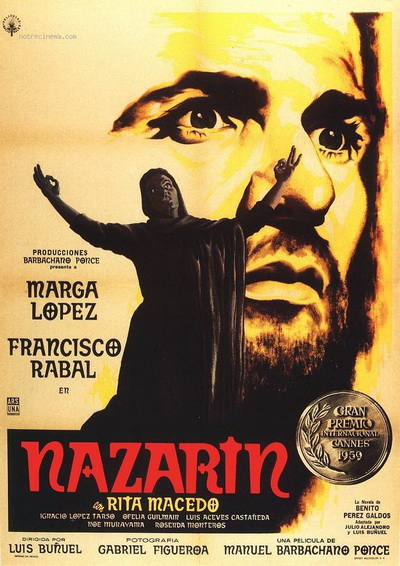 | ||||||||||
| Home | Interviews | Crew | Filming | Photography | Trailer | News | Nazarín | / Español | ||
Nazarín |
||||||||||
"There comes a time when everything fails to Nazarín. In addition he is contradictory. He believes in alms, he has preached in favor of it. Finally, when a poor woman gives him a pineapple, he refuses to accept it. For me, there Nazarín fails, because he is rejecting what has been the basis of his life, his beliefs. And he goes crying ... That attitude of Nazarín intrigue me as much as you. And I am touched. What will become of this man, after such terrible experiences? I dont know ... Luis Buñuel |
Andrei TarkovskiWhich in my opinion is the best film of Buñuel, Nazarín (Mexico, 1958), particularly remarkable for its simplicity. The dramatic structure of the film is reminiscent of a parabola, and its main protagonist to Don Quixote. Bunuel's work is deeply rooted in the classical culture of Spain. One cannot imagine him without his inspired link with Cervantes and El Greco, Lorca and Picasso, Salvador Dali and Arrabal. Their work, filled with passion, angry and tender, intense and defiant, is born on the one hand of a deep love of country, and on the other of their seething hatred for lifeless structures, for the brutal, impassive milking dry of brains. The field of their vision, narrowed by disdain, takes in only that which is alive with human sympathy, the divine spark, ordinary human suffering —with those things which for centuries have seeped into the hot, stony Spanish earth. The Nazarín final scene is really shocking but -and this is especially important- not by its symbolism, which has associations with the Gospel, but because of its great emotional power. It is a magnificent example of the dominant force of the artistic image on the necessary constraints in their ability to articulate content. Only when Nazarín has been seen a second or third time you come to perceive the rational meaning that it contains. |
Max AubIn all the work of Buñuel there are no such tender love scenes like the dwarf Ujo and Andara prostitute. He will never reach such tenderness on dialogue or image. Ujo alone, abandoned in the dust, is so heartbreaking or more than Charlot. |
Octavio PazIn Nazarin, with a style that avoids any complacency and rejects any suspicious lyricism, Buñuel tells the story of a quixotic priest, which his conception of Christianity is soon opposed to the Church, society and the police ... In the tradition of Spanish madman, Buñuel tells the story of a disappointment. For Don Quixote the illusion was chivalry; for Nazarin Christianity. As in his travels through mountains and villages, the image of Christ pales in Nazarín begins to emerge another: that of men. The supernatural gives way to something wonderful: human nature and its powers ... Nazarín refuses the charity of a poor woman, after a moment's hesitation, accept it, not as a gift but as a sign of friendship. Nazarín, the solitary, has ceased to be alone: he has lost God but has found love and brotherhood. |
John HustonSince the end of the war, the two great films I've seen are Bicycle Thieves and Nazarin. Buñuel's film is a masterpiece which will live in film history. Nazarin is an ensemble piece made with profound artistic mood, without concessions whatsoever. It is an exceptional film into the current world production. I have been proud to direct Nazarin. |
Juan Antonio BardemThe Nazarin final scene is the densest, most profound and disturbing scene im the history of the cinema. |
Guillermo del ToroThe film has a harsh truth, which is that you cannot expect charity, or dogma, or theory, to work in the real world. So he's very much anti-institution. He shows you that the government is a moron, that the police are useless, the army is useless, and the church is equally useless. The film has one of the best moments of screenplay I've ever seen: when he's in prison, and the criminal says, `I'm from the bad side, you're from the good side. We're the same.' It's great because it's a brutal moment of realisation for Nazarín: from then on, all the way to the end of the movie, he is truly horrified about his nature, and then finally, humbly accepts the pineapple that's offered to him, but he first rejects it. Nazarín is a paradigm I think of what is a great screenplay, which is, you let the character be defined by his actions. |
1959 • Nazarín • 94 min.  |
CREW Director: Luis Buñuel, |
CAST |
|
|
|